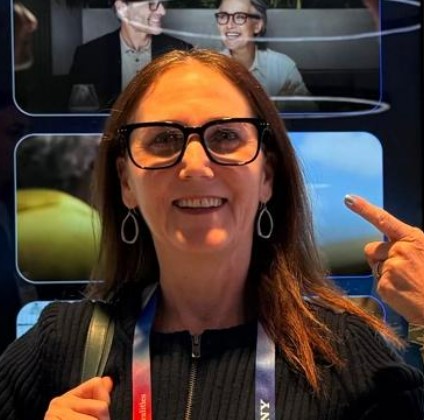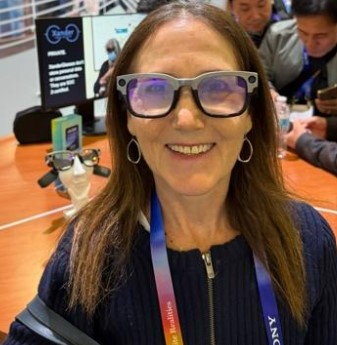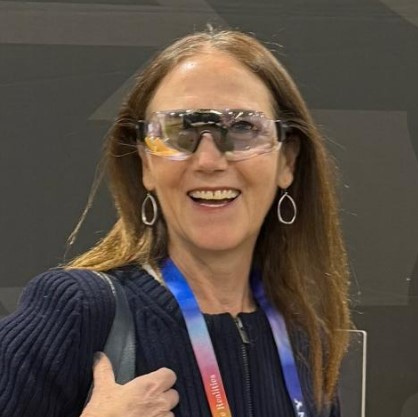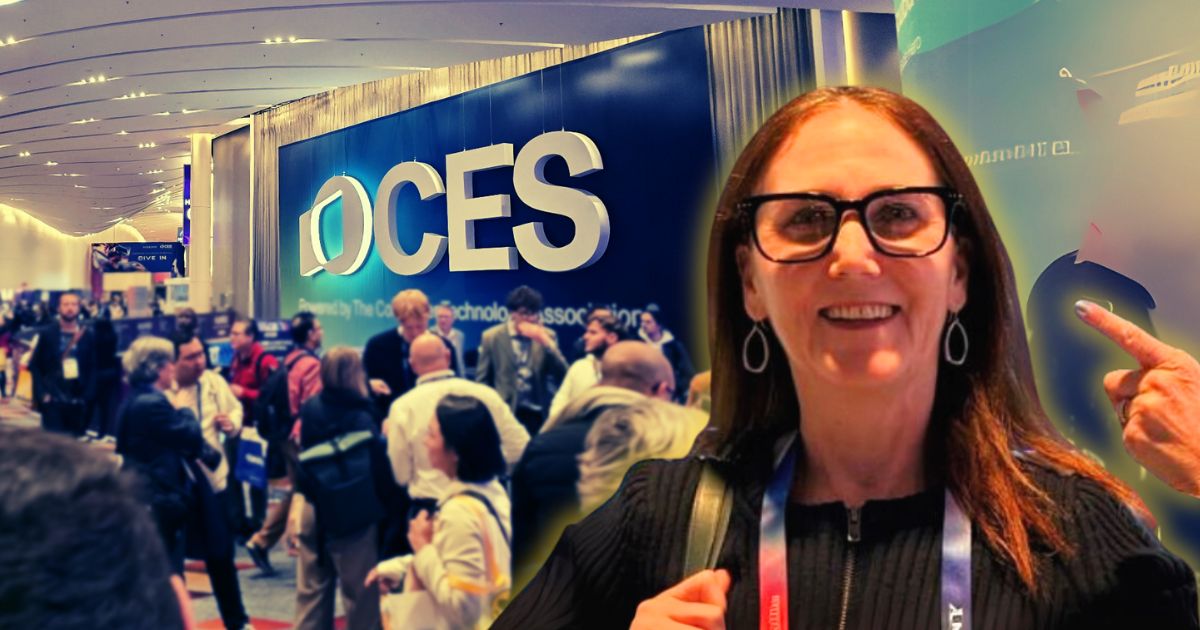The 2025 Consumer Electronics Show (CES) was a blast! In recent years, accessibility, including hearing tech, has been front and center. This year was no exception. Many hearing tech products were on display—OTC hearing aids, sound recognition apps, visual smartphone ringers, and more—but my favorite form factor was one that has been around for generations to help people with their vision.
Glasses!
I highlight some of my favorites below.
Nuance Audio Glasses by EssilorLuxottica
 Discreetly embed OTC hearing aids into stylish eyeglasses and you have Nuance Audio. I am thrilled to see another entrant in the hearing space whose non-traditional form factor is certain to break down the stigma of using hearing devices. Like Apple’s AirPods Pro 2, Nuance Audio provides an easy on-ramp for reluctant first-time users of hearing help.
Discreetly embed OTC hearing aids into stylish eyeglasses and you have Nuance Audio. I am thrilled to see another entrant in the hearing space whose non-traditional form factor is certain to break down the stigma of using hearing devices. Like Apple’s AirPods Pro 2, Nuance Audio provides an easy on-ramp for reluctant first-time users of hearing help.
Designed by EssilorLuxottica, a powerhouse in eyewear for decades, the glasses are attractive, fashionable, and lightweight. Wearing them felt like wearing a normal pair of glasses. The frames come in two of the company’s most popular styles, each in two colors and three sizes to complement almost every face.
Not only do the hearing glasses look good, but they sound good, too! At one point during my trial, I removed them to examine the frames but quickly put them back on because it had become harder to understand my communication partner without them.
If the glasses can improve speech clarity and reduce listening effort in a noisy CES exhibit hall, I have high hopes for what they can do in a loud restaurant or cocktail party environment.
Hearing glasses are not for everyone. As an OTC hearing aid (FDA approval is pending), Nuance Audio is geared toward adults with perceived mild-to-moderate hearing loss. It is self-fitting with four pre-set programs available. Users can easily swap between them as needed whenever the soundscape changes. Wearers can also select directional or all-around sound and can adjust the level of noise cancellation. Battery life is reportedly 8.5 hours of full-throttle use.
Once FDA-approved, the hearing glasses will be available in Luxottica-owned eyeglass stores like LensCrafters and through select hearing care providers and will cost $1100, similar to many higher-quality OTC devices, but well above AirPods Pro 2. An eyeglass prescription can be added for an additional cost.
I can’t wait to give them a try in the real world!
Caption Glasses Continue to Improve
Wouldn’t it be wonderful if everything our communication partners said was captioned on their foreheads in real-time? This dream is getting closer to reality with caption glasses, but challenges remain. I tried two caption glasses options at CES, each with its advantages and flaws.
I am excited that progress is being made, but more work is needed before either solution is likely to be workable in the real world.
Xander Glasses
 The team behind XanderGlasses returned to CES with an upgraded version of their captioned glasses. I tried them two years ago and found them difficult to use. The current version is much better, but some challenges remain. The captions now appear at the same depth of field as the person you are speaking to, so you feel less cross-eyed when you shift focus from your communication partner to the captions. It is probably less disconcerting for the person on the other side of the conversation as well because your eye gaze is steadier in their direction.
The team behind XanderGlasses returned to CES with an upgraded version of their captioned glasses. I tried them two years ago and found them difficult to use. The current version is much better, but some challenges remain. The captions now appear at the same depth of field as the person you are speaking to, so you feel less cross-eyed when you shift focus from your communication partner to the captions. It is probably less disconcerting for the person on the other side of the conversation as well because your eye gaze is steadier in their direction.
On the downside, the glasses continue to be somewhat heavy and clunky, which could limit their usability. Unlike most AI captioning solutions, XanderGlasses perform speech-to-text processing directly on the device, eliminating the need for a connected smartphone and avoiding transcription delays caused by connectivity issues. However, this self-contained functionality contributes to the added weight of the glasses.
Hearsight
 Designed to look like Oakley sunglasses, Hearsight caption glasses look cool and because the auto-captions are processed on a smartphone, they weigh a lot less. Users can view the captions on the glasses, in the smartphone app, or both.
Designed to look like Oakley sunglasses, Hearsight caption glasses look cool and because the auto-captions are processed on a smartphone, they weigh a lot less. Users can view the captions on the glasses, in the smartphone app, or both.
With Hearsight glasses, the captions are positioned up and to the left of the user’s field of vision. This makes it easier to utilize speechreading cues from your communication partner but requires the user to glance away from the speaker to read the captions. I found that distracting, and your conversation partner might as well if your eyes keep darting away from them, but with practice, it might become more natural, especially if you only needed the captions intermittently.
However, if you only need the captions occasionally, it might be easier to forgo the glasses and simply glance down at your phone instead.
The Hearing Tech Future Looks Bright
Innovation in hearing care is alive and accelerating. With AI processing capability rolling out in traditional hearing aids and new form factors making hearing care more palatable to the masses, the future certainly looks bright.

Shari Eberts is a passionate hearing health advocate and internationally recognized author and speaker on hearing loss issues. She is the founder of Living with Hearing Loss, a popular blog and online community for people with hearing loss, and an executive producer of We Hear You, an award-winning documentary about the hearing loss experience. Her book, Hear & Beyond: Live Skillfully with Hearing Loss, (co-authored with Gael Hannan) is the ultimate survival guide to living well with hearing loss. Shari has an adult-onset genetic hearing loss and hopes that by sharing her story, she will help others to live more peacefully with their own hearing issues. Connect with Shari: Blog, Facebook, LinkedIn, Twitter.






